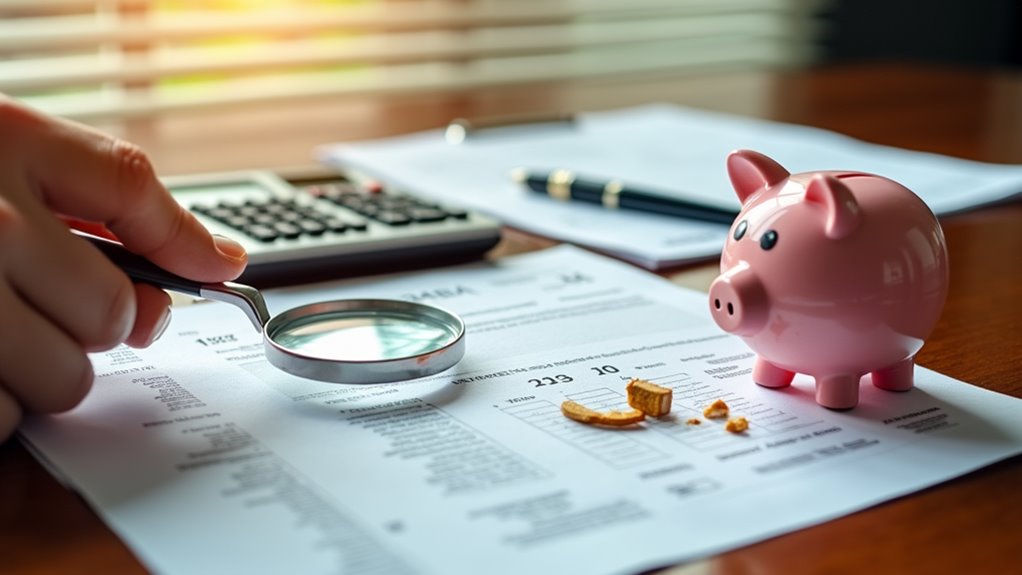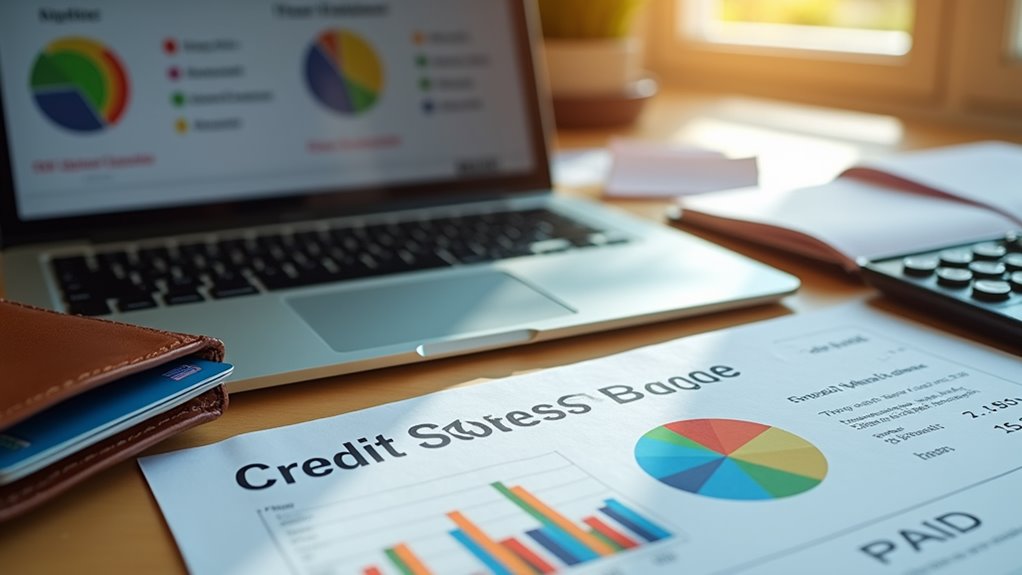You can rebuild your credit score through consistent, strategic actions regardless of past financial challenges. Start by obtaining your free credit reports from all three major bureaus to check for errors and understand your current standing. Secure credit cards can help establish positive payment history, while debt management techniques like the avalanche or snowball method help tackle existing obligations. Set up automatic payments to ensure you never miss due dates, and consider credit-building services like Experian Boost to include utility payments. These foundational steps will put you on the path to a stronger financial reputation and higher credit score.
Key Takeaways
- Monitor your credit reports regularly through AnnualCreditReport.com to identify errors and track progress in your credit rehabilitation journey.
- Establish consistent payment history by setting up automatic payments and ensuring all bills are paid on time every month.
- Consider secured credit cards as a stepping stone to rebuild credit, using the required deposit as collateral while demonstrating responsibility.
- Implement debt management strategies like the avalanche or snowball method to systematically reduce outstanding balances and improve credit utilization.
- Become an authorized user on a responsible person's credit card to benefit from their positive payment history and credit longevity.
Understanding Your Credit Report

Your credit report serves as a financial report card that details your credit history and payment behaviors. It includes information about your credit accounts, payment history, current balances, and any negative marks like late payments or collections.
The three major credit bureaus – Equifax, Experian, and TransUnion – maintain these reports.
You're entitled to one free credit report annually from each bureau through AnnualCreditReport.com. When reviewing your report, you'll want to check for accuracy in your personal information, account statuses, and payment histories.
Look for any unfamiliar accounts that could indicate identity theft. If you spot errors, you can dispute them directly with the credit bureaus.
Understanding your credit report is the first step toward improving your credit score.
Secured Credit Cards Explained
A secured credit card offers an effective path to rebuilding credit for those with damaged or nonexistent credit histories. Unlike traditional credit cards, secured cards require you to make a cash deposit that serves as collateral, typically equal to your credit limit. This deposit protects the card issuer if you default on payments.
When you use a secured card responsibly by making purchases and paying your bills on time, the issuer reports your payment history to the major credit bureaus. Over time, this positive payment history helps improve your credit score.
Many issuers will review your account after 6-12 months of responsible use and may transition you to an unsecured card, returning your deposit. Look for secured cards with low fees and ensure the issuer reports to all three major credit bureaus.
Debt Management Strategies

While secured credit cards can help repair credit, developing sound debt management strategies creates a solid foundation for long-term financial health.
Start by listing all your debts, including balances, interest rates, and monthly payments. You'll want to prioritize high-interest debts while maintaining minimum payments on others.
Consider using either the avalanche method, where you tackle highest-interest debts first, or the snowball method, where you pay off smallest balances first for psychological wins.
You can also explore debt consolidation to simplify payments and potentially secure lower interest rates. If you're struggling, don't hesitate to contact creditors – many offer hardship programs or modified payment plans.
Remember to track your spending and create a realistic budget that allows for both debt repayment and essential expenses.
Building Payment History
Making consistent, on-time payments represents the most influential factor in rebuilding your credit score, accounting for 35% of the FICO calculation. To establish a positive payment history, set up automatic payments for all your bills to ensure you never miss a due date. You'll want to pay at least the minimum amount required, though paying in full is ideal for avoiding interest charges.
If you don't have credit cards or loans to build payment history, consider becoming an authorized user on someone else's credit card or applying for a secured credit card. You can also ask your landlord and utility companies to report your payments to credit bureaus through services like Experian Boost.
Credit Utilization Best Practices

Credit utilization, the second most important factor in your FICO score at 30%, measures how much of your available credit you're using. To maintain a strong credit score, keep your utilization ratio below 30% across all your credit cards, though lower is better.
You can improve your utilization ratio by paying down existing balances, requesting credit limit increases, or opening new credit cards. Consider making multiple payments throughout the month to keep balances low, especially before your statement closing date.
Don't close old credit cards unless necessary, as this reduces your available credit and can increase your utilization ratio. Monitor both your overall utilization and individual card utilization, as both impact your score.
If you're carrying high balances, focus on paying them down strategically to optimize your credit profile.
Recovery After Bankruptcy
Rebuilding after bankruptcy takes at least 7-10 years before the record falls off your credit report, but you can start taking positive steps immediately.
Focus on establishing new, positive credit history by opening a secured credit card with a small deposit and making consistent, on-time payments.
Create a strict budget to avoid falling back into debt, and save an emergency fund to prevent future financial crises.
Make all post-bankruptcy payments on time, including utilities and rent, as these can now affect your credit score.
You'll need to explain your bankruptcy to future lenders, so prepare an honest explanation that emphasizes the lessons learned and your new financial habits.
Consider working with a credit counselor to develop a personalized recovery strategy and monitor your credit reports regularly to ensure accuracy.
Long-Term Credit Maintenance Tips

You'll need to keep close tabs on your credit reports from all three major bureaus to maintain your improved credit score.
Setting up automatic payment reminders can help you avoid missed payments that could damage your progress.
These two habits form the foundation of responsible credit management and will serve you well for years to come.
Monitor All Credit Reports
Once you've started rebuilding your financial health, regularly monitoring your credit reports becomes essential for maintaining your progress.
You're entitled to free annual reports from each of the three major credit bureaus – Experian, TransUnion, and Equifax – through AnnualCreditReport.com.
When reviewing your reports, look for errors, unfamiliar accounts, or incorrect payment histories that could harm your score.
Pay special attention to late payments, collections, or derogatory marks that shouldn't be there.
If you spot inaccuracies, file disputes promptly with the relevant credit bureau.
Consider staggering your free reports every four months to maintain year-round monitoring.
Many credit card companies and financial institutions also offer free credit monitoring services, which can alert you to significant changes in your reports.
Set Recurring Payment Reminders
Missing even a single payment can derail your credit rebuilding progress, which is why setting up reliable payment reminders is crucial for long-term success.
You'll want to establish multiple reminder systems to ensure you never miss a due date. Set up automatic alerts through your bank's mobile app and enable text or email notifications for upcoming payments.
You can also use calendar apps like Google Calendar or Apple Calendar to create recurring monthly reminders several days before each bill is due. If you prefer a more comprehensive approach, consider using dedicated budgeting apps that track all your payment schedules in one place.
Don't rely solely on autopay features – while convenient, it's essential to maintain enough funds in your account to cover scheduled payments and regularly review your payment activity.
Frequently Asked Questions
Can a Spouse's Poor Credit Score Affect My Own Credit Rating?
Your spouse's poor credit score won't directly impact your individual credit rating.
However, if you share joint accounts, credit cards, or loans, their payment history and credit usage will affect your score.
When you apply for joint credit, lenders will consider both scores, and your spouse's low score could result in higher interest rates or loan denials for joint applications.
How Do Credit Repair Companies Work and Are They Worth Using?
Like a mechanic promising to fix your car's engine, credit repair companies claim they can polish your credit report by disputing negative items with credit bureaus.
They'll charge monthly fees to identify and challenge errors, late payments, or outdated information.
While they can't remove accurate negative information, you can actually do everything they offer yourself for free through direct disputes with credit bureaus and careful credit monitoring.
Will Checking My Credit Score Multiple Times Hurt My Rating?
Checking your own credit score won't hurt your rating, as these are considered "soft inquiries." You can monitor your score as often as you'd like through credit reporting websites or your credit card company.
However, when lenders check your credit for loan applications, these "hard inquiries" can temporarily lower your score. These hard inquiries typically drop off your report after two years.
Does My Income Directly Influence My Credit Score Calculation?
Contrary to what you might think, your paycheck isn't part of the credit score equation.
While your income might feel like the backbone of your financial life, credit scoring models don't factor in how much you earn.
Instead, they focus on how you manage your money – whether you pay bills on time, your credit utilization, length of credit history, and the mix of credit types you maintain.
Can Medical Bills in Collections Be Removed From Credit Reports?
Yes, you can get medical bills removed from your credit reports.
Once you've paid or settled the medical collection account, it'll be automatically removed from your credit reports within 30 days.
Even unpaid medical collections won't appear on your credit reports for 12 months after being sent to collections, giving you time to resolve billing issues or set up payment arrangements.
Conclusion
Your credit comeback journey isn't a sprint – it's a calculated climb. Take inspiration from Sarah, who rebuilt her score from 520 to 750 in just two years by following these strategies. She started with a secured card, never missed a payment, and kept her credit utilization under 30%. You'll need patience and discipline, but with consistent effort, you can transform your financial future.

Leave a Reply